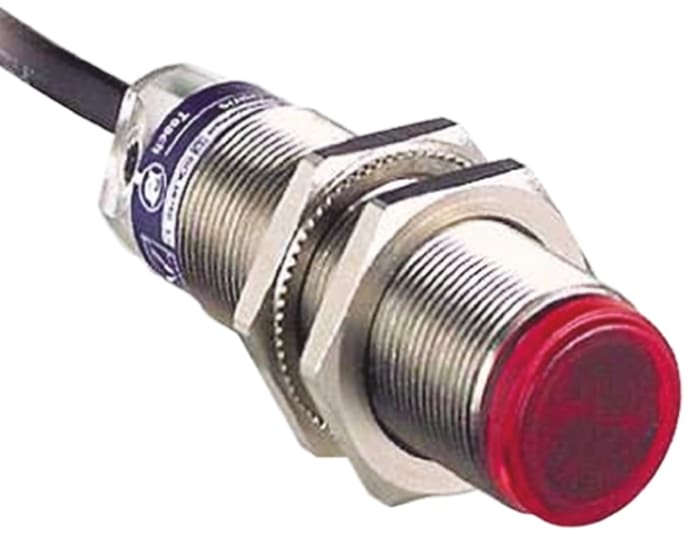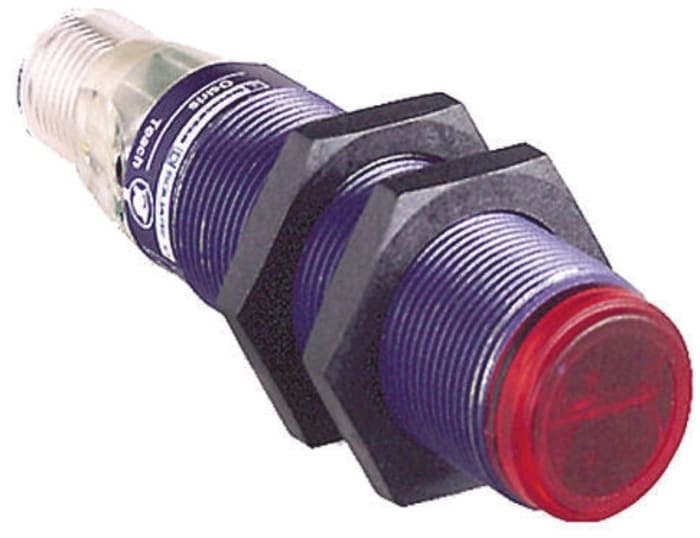Technical Document
Specifications
Sensor Style
Barrel
Detection Type
Through Beam
Detection Range
15 m
Output Type
PNP
Electrical Connection
M12 4 Pin Connector
Maximum dc Voltage
24V
Light Source
Infrared
IP Rating
IP65, IP67
Maximum Current
100 mA
Response Time
<1 ms
Minimum Operating Temperature
-25°C
Housing Material
Nickel Plated Brass
Maximum Operating Temperature
+55°C
Better World Verification
Green Premium
Country of Origin
Indonesia
Product details
Telemecanique XU range photoelectric Sensors (M18 Cylindrical).
Telemecanique OsiSense XU Photoelectric sensors provide you everything you require from photoelectric proximity sensors for applications within material handling to food and beverage industries. Various functions are available, diffuse mode, (BGS) Background suppression, polarize reflex, laser reflex and through-beam and through beam. The UX range further is available in 4 internationally recognised formats:
- General purpose. Lasers. Forks and frames. Specific application sensors.
How do they work and where can I use them?
- An OsiSense Photoelectric has a light beam transmitter (light-emitting diode, LED) and a light-sensitive receiver (photo-transistor). A light-emitting diode is an electronic semi-conductor component emitting light when electric current flows through it. The light can be visible or invisible, depending on the transmission wavelength.
- An object is detected when it enters the transmitted light beam and, in so doing, affects the intensity of the light at the receiver.
- Depending on the model and application requirements, the transmission beam is either non-visible infrared or ultraviolet (for detection of luminescent materials). It may also be a visible red or green (for colour mark reading etc.) and laser red (for long sensing distance and short focal length).
- The advantage of LEDs is their very fast response. To render the system insensitive to ambient light, the current flowing through the LED is modulated to produce a pulsed light transmission. Only the pulsed signal will be used by the photo-transistor and processed to control the load.
Photelectric Sensor Systems Available.
Through-Beam or Multimode (set in through-beam mode).
- Longer sensing distance – (up to 100 m – XUBL line).
- Precise detection with high repeat accuracy.
- Not affected by colour or position angle.
- Good resistance to difficult environments – example- dust, dirt.
- When using several sensors ensure the sensors do not disrupt each other.
Polarised Reflex system or Multimode (with reflector accessory).
- Medium sensing distance – (up to 15 m).
- Precise detection.
- Only one unit wired.
- No effect on detection by colour or position angle.
- Visible Red beam transmission.
- When using several sensors ensure the sensors do not disrupt each other.
Multimode sensor (with reflector accessory).
- Easy alignment. 3 LEDs providing set-up assistance.Anti-interferance function (2 sensors can be used with no alignment precautions). Semi-transparent objects detected by using teach mode function.
Diffuse System or Multimode.
- Short sensing distance. Only one unit to be wired.
- Easy to use. Fast response. Low cost.
- Sensitive to background colours and the working environment (dirt, dust).
- When using several sensors ensure the sensors do not disrupt each other.
Optical Forks.
- Made from metal a strong and sturdy sensor suitable for packaging and conveying applications with label detection. No alignment needed in through-beam mode.
- Only one connection needed. LEDs. Adjustable or fixed. Detect small parts – minimum size detected to 0.05 mm.
- High switching frequency from 4 kHz to 25 kHz. – excellent for higher operating rates.
€ 127.33
€ 127.33 Each (ex VAT)
€ 151.52
€ 151.52 Each (inc. VAT)
1
€ 127.33
€ 127.33 Each (ex VAT)
€ 151.52
€ 151.52 Each (inc. VAT)
1
Stock information temporarily unavailable.
Please check again later.
Technical Document
Specifications
Sensor Style
Barrel
Detection Type
Through Beam
Detection Range
15 m
Output Type
PNP
Electrical Connection
M12 4 Pin Connector
Maximum dc Voltage
24V
Light Source
Infrared
IP Rating
IP65, IP67
Maximum Current
100 mA
Response Time
<1 ms
Minimum Operating Temperature
-25°C
Housing Material
Nickel Plated Brass
Maximum Operating Temperature
+55°C
Better World Verification
Green Premium
Country of Origin
Indonesia
Product details
Telemecanique XU range photoelectric Sensors (M18 Cylindrical).
Telemecanique OsiSense XU Photoelectric sensors provide you everything you require from photoelectric proximity sensors for applications within material handling to food and beverage industries. Various functions are available, diffuse mode, (BGS) Background suppression, polarize reflex, laser reflex and through-beam and through beam. The UX range further is available in 4 internationally recognised formats:
- General purpose. Lasers. Forks and frames. Specific application sensors.
How do they work and where can I use them?
- An OsiSense Photoelectric has a light beam transmitter (light-emitting diode, LED) and a light-sensitive receiver (photo-transistor). A light-emitting diode is an electronic semi-conductor component emitting light when electric current flows through it. The light can be visible or invisible, depending on the transmission wavelength.
- An object is detected when it enters the transmitted light beam and, in so doing, affects the intensity of the light at the receiver.
- Depending on the model and application requirements, the transmission beam is either non-visible infrared or ultraviolet (for detection of luminescent materials). It may also be a visible red or green (for colour mark reading etc.) and laser red (for long sensing distance and short focal length).
- The advantage of LEDs is their very fast response. To render the system insensitive to ambient light, the current flowing through the LED is modulated to produce a pulsed light transmission. Only the pulsed signal will be used by the photo-transistor and processed to control the load.
Photelectric Sensor Systems Available.
Through-Beam or Multimode (set in through-beam mode).
- Longer sensing distance – (up to 100 m – XUBL line).
- Precise detection with high repeat accuracy.
- Not affected by colour or position angle.
- Good resistance to difficult environments – example- dust, dirt.
- When using several sensors ensure the sensors do not disrupt each other.
Polarised Reflex system or Multimode (with reflector accessory).
- Medium sensing distance – (up to 15 m).
- Precise detection.
- Only one unit wired.
- No effect on detection by colour or position angle.
- Visible Red beam transmission.
- When using several sensors ensure the sensors do not disrupt each other.
Multimode sensor (with reflector accessory).
- Easy alignment. 3 LEDs providing set-up assistance.Anti-interferance function (2 sensors can be used with no alignment precautions). Semi-transparent objects detected by using teach mode function.
Diffuse System or Multimode.
- Short sensing distance. Only one unit to be wired.
- Easy to use. Fast response. Low cost.
- Sensitive to background colours and the working environment (dirt, dust).
- When using several sensors ensure the sensors do not disrupt each other.
Optical Forks.
- Made from metal a strong and sturdy sensor suitable for packaging and conveying applications with label detection. No alignment needed in through-beam mode.
- Only one connection needed. LEDs. Adjustable or fixed. Detect small parts – minimum size detected to 0.05 mm.
- High switching frequency from 4 kHz to 25 kHz. – excellent for higher operating rates.



